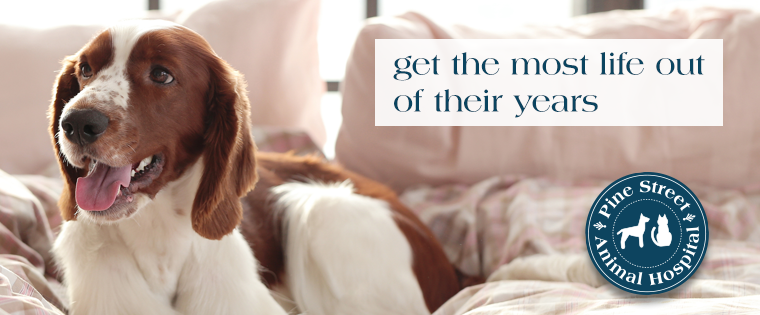There has never been a better time to be a companion animal than right now—and it’s only getting better. In the not-too-distant past, dogs and cats were relegated to the outside. Cats were there to keep the mouse and rat population down around the farm, and dogs stayed outside and served many functions, from house alarm to hunting companions. Cats ate what they could find and dogs were fed off of old hub caps and drank from dirty old five-gallon buckets. After four or five years, if they were lucky, these outdoor “pets” would succumb to disease, parasites, fight wounds or to the neighbor if they were caught in the chicken coop or pasture. Livestock was a valued commodity and killers of livestock were not tolerated.
Today our pets have moved from the barnyard to the porch to the couch, and many now to the bedroom with us. The result of deepening these bonds has been an increase in life span. To put it simply, we’re taking better care of our animals because they mean more to us and are more than just tools. As pet owners, we have come a long way, but listed below are a few ways we can increase their lives and ensure the extra time is quality time.
Good care starts at puppyhood. Start and complete all puppy and kitten vaccines. This baseline immune response is the most important part of pet ownership. See our vaccine blog for more information on needs and schedules). At the same time you start puppy and kitten vaccines, you need to get them on a good internal and external parasite control program. Heartworms, intestinal worms, fleas and ticks are too easy to prevent to allow them to become a health problem.
Watch that weight! Pets who maintain a good body condition and a good weight are far healthier, happier and are more active and playful. This is a tough one to sell because it is hard to say no to those sweet, begging eyes sometimes. Just remember: they cannot feed themselves, you have the control, and food does not equal love! It is far easier to start and maintain good habits than it is to break bad ones. So having a No Table Food policy from the start is very important.
Keep your pets indoors or in a safe area. We all love being outside, and so do our critters; but it’s a rough world out there, and the life an unconfined dog and cat is brutal. Cat fight wounds and abscesses as well as feline leukemia and feline AIDS are the most common side effects of outdoor life. Outdoor cats and dogs both are at risk of being hit by cars. This presents a safety hazard to people in addition to the injury/loss-of-life risk to your pet. No one wants to run over a dog or cat. Swerving to avoid an animal in the road leads to accidents that can take the life of the driver.
Preventative health-care programs and pre-screening bloodwork can help eliminate illness and aid in early detection of some geriatric diseases such as renal disease, thyroid dysfunction and liver issues. Talk with your veterinarian and come up with a game plan on how to avoid and detect so there are no surprises.
We love having our pets so close to us. Let us help you make sure those extra years that closeness gives them are great years for all of you!



